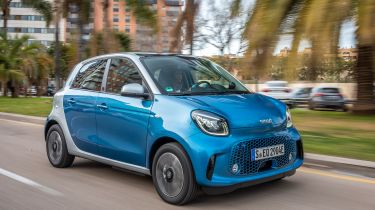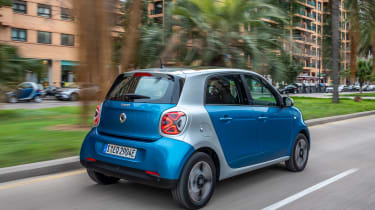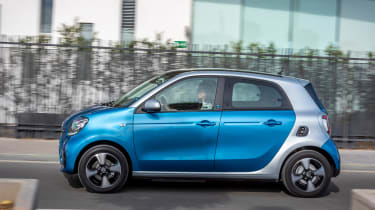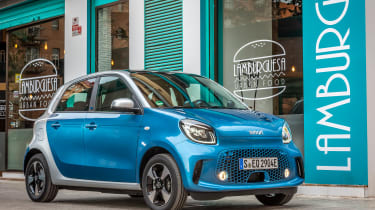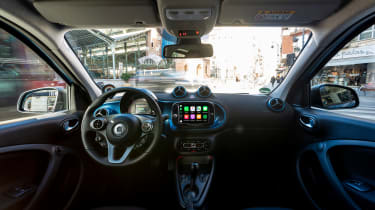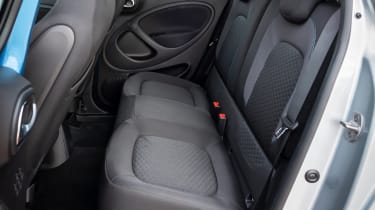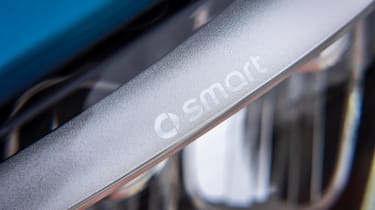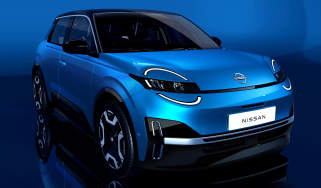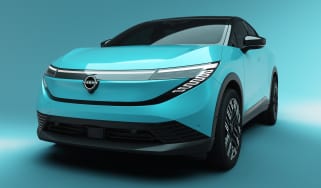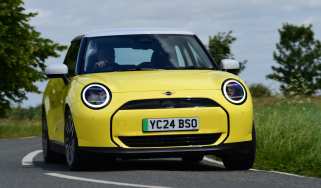Smart EQ ForFour hatchback (2019-2022)
"The Smart EQ ForFour is a stylish, fun electric car for the city but its range is relatively limited"
Pros
- Low running costs
- Enjoyable to drive around town
- Brisk acceleration
Cons
- Poor infotainment
- Rivals have better range
- Small boot
The Smart EQ ForFour is a four-seat city car that’s agile around town while offering zero emissions, smooth power delivery and a range of up to 81 miles from a single charge.
A facelift for 2020 resulted in mostly visual changes, adding a smoother bonnet, larger grille and new lights, along with different wheel designs. The interior was also upgraded with a new centre console, serving up new cupholders and a place for smartphones, and it still feels high quality.
The 60kW electric motor provides 80bhp, and because this power can be deployed almost immediately, the ForFour feels very nippy when pulling away from traffic lights and junctions. The level of standard equipment is good, the car is no less practical than rivals like the Volkswagen e-up! and buyers still have plenty of personalisation options, with numerous combinations of two-tone exterior paint finishes.
The two main problems with the Smart EQ ForFour relate to the battery and the car’s price. The latest Renault ZOE is available with a 50kWh battery that delivers vastly better range than the 17.6kWh battery in the EQ ForFour – the Renault manages around 160 miles more than the Smart on a full charge. However, if you plan to use your city car for short journeys (as many do), the Smart’s claimed 81-mile range could still be adequate.
It takes less than six hours to charge the battery pack using a 7kW wallbox. A standard 22kW on-board charger also means suitable public chargers can replenish the batteries from 10 to 80% in 40 minutes. Cables for home and public charging are included with the EQ ForFour, along with a bag to store them in.
More reviews
Given the drawbacks of the EQ’s battery and the car’s relatively high price, it’s hard to justify buying one as your only car – a case that’s easier to make for the Volkswagen e-up! and Renault ZOE. The EQ ForFour is a competent performer, and plenty of people will like its looks and relative rarity on the road but there are a number of important reasons to consider the alternatives before buying one.
MPG, running costs & CO2
The Smart EQ ForFour is very cheap to run. Since it relies only on electric power, it produces no direct CO2 emissions, putting it in the lowest tax band for company-car drivers. It's also exempt from the London Congestion Charge and VED (road tax), saving around £150 a year, and is eligible for the Government's Plug-in Car Grant.
A full charge takes less than six hours using a home wallbox, should cost just a few pounds in electricity and last up to 81 miles.
Given the ForFour costs around the same as the Volkswagen e-up!, SEAT Mii Electric and Skoda Citigo e iV and they can all manage around 160 miles on a charge, the range is slightly disappointing. It’s also worth bearing in mind that the more expensive Renault ZOE boasts a 50kWh battery pack and 245-mile range. However, the EQ FourFour is clearly aimed at city driving, and in this environment 80 miles should be plenty. Insurance and maintenance costs should also be among the lowest of any car.
Engines, drive & performance
The electric motor in the Smart EQ ForFour produces 80bhp and like every electric car, all of the EQ ForFour’s power is available virtually instantly. This makes it feel very nippy around town and when pulling away from traffic lights and much quicker than its official 0-62mph time of 12.7 seconds suggests.
The EQ ForFour’s composure and ride quality is a marked improvement on Smarts of old, with only really big potholes thumping through to the cabin. A Volkswagen e-up! feels more planted and stable than the ForFour, and the ForTwo is a better performer because it’s lighter, but overall the five-door Smart is still fun and nippy enough round town. It also boasts an incredibly tight turning circle, making it possible to perform U-turns at the drop of a hat.
Interior & comfort
Where the now discontinued petrol-powered Smart ForFour has a dash-mounted rev-counter, the EQ version has an easy-to-read power and charge dial. Other than that, the electric ForFour interior is bright and playful with lots of scope for personalisation. Smart's 2020 facelift introduced a new centre console with two cupholders and a useful tray for smartphones, but the Renault-derived infotainment system is still rather dated and slow, with Android Auto but no Apple CarPlay.
The switchgear feels well made and most of the cabin materials are of good quality, except for the odd bit of scratchy plastic. Higher trims also get a mixture of fabric and leather trim highlights around the interior, making it feel a cut above most city cars.
The entry-level Passion Advanced trim is fitted with 15-inch alloy wheels, parking sensors, climate control and even cruise control. Pulse Premium costs around £1,100 extra and brings bigger 16-inch wheels, sunroofs and a rear-view camera, while the top Prime Exclusive gets LED headlights, ambient lighting and automatic wipers.
Practicality & boot space
Turning the ForFour into an electric car hasn’t made it any less practical, which is a good job considering the conventional model already lagged behind key rivals. Boot space in the Smart EQ ForFour stands at 185 litres, which is significantly down on the 250 litres in the Volkswagen e-up!, while a conventionally powered Hyundai i10 offers 252 litres of capacity.
The good news is that folding down the ForFour’s rear seats frees up 975 litres of space, which is actually more than the VW and only slightly behind the i10.
Interior space isn’t class-leading, however. There’s enough room in the back for two adults (there’s no middle seat) and getting in is easy enough thanks to doors that open wide, but four people over six feet tall are going to find the ForFour feels cramped fairly quickly on anything but the shortest trips.
Reliability & safety
Smart has close ties with Mercedes, which would lead you to conclude that its cars would have a similarly good reputation for reliability. Sadly, that hasn’t always proved the case, with some of its cars in the past receiving poor scores in our Driver Power customer satisfaction surveys and not appearing at all in 2019.
The ForFour was awarded four stars by Euro NCAP when it was crash-tested, with a 78% score for adult occupant protection. Occupants sit inside a ‘Tridion safety cell’, a reinforced module designed to spread and absorb the impact of a crash in order to protect the people inside it.

